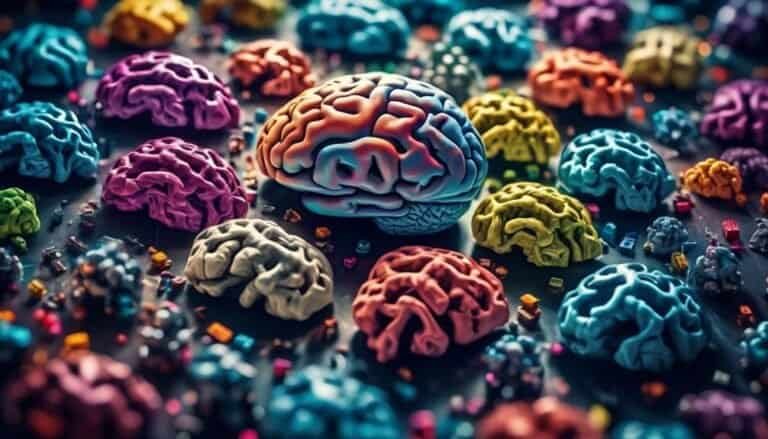Managing Anxiety the Neurodiverse Way: Techniques for ADHD, Autism, and Beyond
When managing anxiety the neurodiverse way, focus on tailored techniques for ADHD and autism challenges. Use mindfulness practices for calmness. Implement sensory strategies to relieve anxiety. Explore cognitive behavioral tools for ADHD symptoms. Seek social support for shared experiences. Practice self-care tips like deep breathing and mindful movements. Consider holistic approaches such as mindfulness meditation and herbal remedies. These techniques offer effective ways to manage anxiety and foster well-being for neurodiverse individuals.
Key Takeaways
- Incorporate sensory-friendly environments and tools for calming effects.
- Practice mindfulness and deep breathing exercises for anxiety regulation.
- Implement structured routines and coping strategies tailored to individual needs.
- Utilize cognitive behavioral tools and focus techniques for ADHD symptom management.
- Seek social support, therapy, and community resources for holistic well-being.
Understanding Neurodiversity and Anxiety
If you're a neurodiverse individual, understanding the relationship between neurodiversity and anxiety is important for managing your mental health effectively. Neurodiversity acceptance plays a vital role in this understanding. Recognizing that your brain functions differently is the first step towards self-acceptance and embracing your unique strengths and challenges.
Anxiety triggers can vary widely among neurodiverse individuals. For some, sensory processing challenges such as sensitivity to light, sound, or touch can be overwhelming and lead to heightened anxiety levels. Understanding your sensory triggers and creating a calming environment can greatly reduce anxiety in such situations.
Emotional regulation is another key aspect to take into account. Neurodiverse individuals may experience difficulties in regulating their emotions, which can contribute to increased anxiety. Developing strategies to identify and cope with intense emotions can help in managing anxiety effectively. Techniques like mindfulness, deep breathing, or seeking support from a therapist can aid in improving emotional regulation and reducing anxiety levels.
Tailoring Techniques to ADHD Challenges
You may find that ADHD poses unique challenges when managing anxiety. Techniques such as structured focus strategies, tailored to ADHD tendencies, can assist in maneuvering overwhelming thoughts.
Implementing sensory strategies commonly used for individuals with autism may also provide relief for those with ADHD.
ADHD Focus Techniques
Tailoring focus techniques to address the challenges associated with ADHD can greatly improve attention and productivity for neurodiverse individuals. When dealing with ADHD, implementing strategies tailored to your unique needs is key.
Here are some techniques to help you enhance your focus:
- Chunking Tasks: Break down larger tasks into smaller, more manageable chunks to prevent feeling overwhelmed.
- Time Blocking: Allocate specific time slots for different tasks to improve time management and reduce distractions.
- Visual Reminders: Utilize visual aids like color-coded calendars or sticky notes to enhance organization and task prioritization.
Autism Sensory Strategies
Wondering how sensory strategies can be tailored to address the challenges of ADHD in individuals with autism? Sensory processing differences are common in autism, leading to sensory overload. To help manage this, creating a sensory-friendly environment can be beneficial.
Consider using noise-canceling headphones to reduce auditory distractions or providing a weighted blanket for calming proprioceptive input. Tailoring sensory strategies to the specific needs of individuals with autism and ADHD can greatly improve their focus and overall well-being.
Additionally, incorporating sensory breaks throughout the day can help regulate sensory input and prevent overwhelming situations. By understanding and accommodating sensory needs, individuals with autism and ADHD can better navigate their environment and minimize stress triggers.
Neurodiversity Coping Methods
Dealing with the challenges of ADHD within the domain of neurodiversity calls for customized coping methods that address the specific needs of individuals with this condition. When tailored to ADHD challenges, these techniques can make a significant difference in managing anxiety levels.
- Mindfulness exercises: Engaging in mindfulness practices can help individuals with ADHD stay present and reduce feelings of overwhelm.
- ADHD relaxation techniques: Utilizing relaxation techniques tailored to ADHD can assist in calming the mind and body, promoting a sense of peace and well-being.
- Structured routines: Establishing structured routines can provide a sense of predictability and stability, which can be particularly beneficial for individuals with ADHD.
Mindfulness Practices for Autism
Exploring mindfulness techniques can provide valuable tools for individuals with autism to manage anxiety and enhance emotional regulation. Mindfulness practices focus on being present in the moment without judgment, which can be especially beneficial for those on the autism spectrum. By incorporating sensory grounding and meditation practices into daily routines, individuals with autism can cultivate a sense of calm and improve their overall well-being.
To help you understand how to integrate mindfulness practices into your life, here is a simple table outlining some techniques you can try:
| Technique | Description |
|---|---|
| Mindful Breathing | Focus on your breath, noticing the sensation as you inhale and exhale slowly. |
| Body Scan Meditation | Pay attention to each part of your body, starting from your toes and working up to your head. |
| Sensory Grounding | Engage your senses by focusing on what you see, hear, feel, smell, and taste in the moment. |
Incorporating these mindfulness techniques can help individuals with autism build resilience against anxiety and stress while promoting emotional well-being.
Sensory Strategies for Anxiety Relief
When anxiety strikes, consider using calming sensory tools like fidget spinners or stress balls to ground yourself.
Deep pressure techniques, such as weighted blankets or compression vests, can provide a comforting sense of security during stressful moments.
Mindful breathing exercises, like the 4-7-8 technique, can help regulate your nervous system and promote relaxation.
Calming Sensory Tools
Using sensory tools can be an effective way to manage anxiety for neurodiverse individuals. These tools help in sensory grounding, providing a sense of stability and control in overwhelming situations. Visual distractions can also be powerful in redirecting your focus away from anxious thoughts, offering a moment of relief.
Here are three calming sensory tools to contemplate:
- Weighted Blankets: These blankets provide deep pressure, promoting relaxation and reducing anxiety levels.
- Fidget Toys: Engaging with fidget toys can help channel nervous energy and improve focus during stressful moments.
- Noise-Canceling Headphones: Blocking out auditory distractions can create a calming environment, especially in noisy or chaotic settings.
Integrating these tools into your daily routine can enhance your anxiety management strategies.
Deep Pressure Techniques
If you're looking to expand your anxiety management toolkit, exploring deep pressure techniques can offer valuable sensory strategies for relief. Weighted blankets provide comforting pressure that can help calm the nervous system, making them a popular choice for individuals seeking a sense of security.
Fidget toys offer a discreet way to apply deep pressure through squeezing or manipulation, redirecting restless energy and promoting focus. Compression clothing, like snug vests or shirts, can provide a consistent gentle pressure that may help reduce anxiety levels.
Stress balls are another portable option for applying deep pressure to soothe nerves and alleviate tension. Incorporating these deep pressure techniques into your daily routine may offer a tangible sense of comfort and relaxation when dealing with moments of heightened anxiety.
Mindful Breathing Exercises
Explore the calming benefits of mindful breathing exercises as effective sensory strategies for managing anxiety in neurodiverse individuals. When feeling overwhelmed, these breathing techniques can help ground you in the present moment and promote relaxation. Here are some relaxation exercises and focus techniques to incorporate into your routine:
- Diaphragmatic Breathing: Focus on deep breathing from your diaphragm to slow down your heart rate and calm your mind.
- Box Breathing: Inhale for a count of 4, hold for 4, exhale for 4, hold for 4, then repeat. This technique can help regulate your breathing pattern.
- Mindful Observation: Engage your senses by observing your surroundings, focusing on what you see, hear, smell, and feel. This practice can help shift your attention away from anxious thoughts.
Cognitive Behavioral Tools for ADHD
Consider incorporating a structured approach to cognitive behavioral tools when managing ADHD symptoms. For individuals with ADHD, techniques like mindfulness meditation and cognitive restructuring can be particularly beneficial. Mindfulness meditation involves focusing on the present moment, which can help reduce impulsivity and improve attention control. By practicing mindfulness regularly, you may enhance your ability to stay focused and regulate your emotions, ultimately mitigating ADHD symptoms.
Cognitive restructuring, on the other hand, involves identifying and challenging negative thought patterns. By recognizing and reframing distorted thoughts, you can change how you perceive situations and react to them. This can be especially helpful for individuals with ADHD who often struggle with self-critical or defeatist thinking patterns.
Incorporating these cognitive behavioral tools into your daily routine can provide you with practical strategies to better manage ADHD symptoms. Remember, consistency is key when implementing these techniques. By cultivating mindfulness and restructuring your thoughts, you can empower yourself to navigate the challenges associated with ADHD more effectively.
Social Support for Neurodiverse Individuals
For individuals with neurodiverse conditions, having a robust social support system can greatly enhance overall well-being and mental health. Here are some key ways in which social support can benefit neurodiverse individuals:
- Peer Mentoring: Engaging in peer mentoring programs allows individuals with neurodiverse conditions to connect with others who've similar experiences. This form of support can provide valuable insights, empathy, and practical strategies for maneuvering challenges.
- Group Therapy: Participating in group therapy sessions tailored to neurodiverse individuals can offer a supportive environment to share experiences, learn coping skills, and build social connections. These sessions can help reduce feelings of isolation and provide a sense of belonging.
- Community Resources and Online Forums: Accessing community resources and online forums dedicated to neurodiversity can provide a platform for individuals to seek advice, share successes and struggles, and find a sense of community beyond their immediate circles. These resources can offer valuable information, emotional support, and a sense of validation.
Self-Care Tips for Managing Anxiety
To effectively manage anxiety, incorporating self-care practices tailored to your specific needs and preferences can greatly improve your overall well-being. Grounding exercises, such as deep breathing or focusing on your senses, can help bring you back to the present moment and reduce feelings of overwhelm. Engaging in mindful movement activities like yoga or tai chi can also help calm your mind and body.
Nature therapy, or spending time outdoors in green spaces, has been shown to lower stress levels and improve mood. Whether it's taking a walk in the park or simply sitting in your backyard, connecting with nature can provide a sense of peace and tranquility.
Additionally, engaging in creative expression through art, music, or writing can be a therapeutic outlet for processing emotions and reducing anxiety.
Holistic Approaches to Anxiety Management
Explore incorporating holistic approaches such as mindfulness practices, dietary adjustments, and herbal supplements into your anxiety management routine for all-encompassing well-being support.
- Mindfulness Meditation: Engaging in mindfulness meditation can help you stay present, reduce racing thoughts, and cultivate a sense of calm. By focusing on the present moment without judgment, you can alleviate anxiety symptoms and enhance your overall mental well-being.
- Herbal Remedies: Consider exploring herbal remedies like chamomile, lavender, or passionflower, known for their calming properties. These natural supplements can complement traditional treatments and provide a gentle approach to managing anxiety symptoms.
- Dietary Adjustments: Pay attention to your diet as certain foods can impact anxiety levels. Incorporating nutrient-rich foods like fruits, vegetables, whole grains, and omega-3 fatty acids can support your mental health. Additionally, reducing caffeine and sugar intake may help stabilize mood and decrease anxiety.
Conclusion
As you navigate the labyrinth of anxiety with your unique neurodiverse mind, remember that there are many paths to finding peace and calm.
Just like a garden with diverse flowers, each technique tailored to ADHD, autism, and beyond can bloom beautifully in your journey towards managing anxiety.
Embrace mindfulness, seek sensory relief, utilize cognitive tools, lean on social support, practice self-care, and explore holistic approaches.
You aren't alone in this maze, and there's light at the end of the tunnel.








